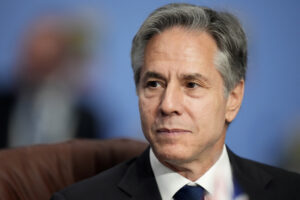TRANSCRIPT: Secretary Antony J. Blinken With Darius Rochebin of LCI/TF1 [Excerpt]

(U.S. State Department – April 2, 2024)
INTERVIEW
ANTONY J. BLINKEN, SECRETARY OF STATE
CHIEF OF MISSION RESIDENCE
PARIS, FRANCE
QUESTION: Good evening, Mr. Secretary of State. Antony Blinken, you’re head of U.S. foreign policy. First, Ukraine’s cry for help. Is the United States in a position to promise that the Ukrainian state, that Kyiv, will never fall into Russian hands?
SECRETARY BLINKEN: I am convinced we already have. In other words, it is not happening, it’s never going to happen. At the beginning of the Russian aggression in 2022, we thought there was a possibility that Kyiv would fall. But thanks to the incredible resistance of the Ukrainian people, and thanks also to the support given to Ukraine by the United States, France and other countries, Putin’s desire to conquer the whole country, to wipe it off the map, to make it part of a greater Russia, has not materialized and it won’t.
QUESTION: Mr. Zelenskyy said: “We’re not 100% sure that Putin won’t use nuclear weapons.” And he added, “That’s what makes President Biden cautious.” Do you, indeed, have to take that risk into account?
SECRETARY BLINKEN: From the start, from day one, President Biden was convinced of two things: that we had to do everything possible to support Ukraine, because the aggression against Ukraine was not just an aggression against the Ukrainian people and against the country, but against all the basic principles of the international system. But he was also convinced that we had to avoid a war with Russia.
QUESTION: A nuclear escalation?
SECRETARY BLINKEN: An escalation, whether conventional or nuclear. And so, since then, he’s been leading with great clarity in this direction: supporting Ukraine but avoiding a war with Russia.
QUESTION: It’s not just theoretical. Don’t we remember the warning that went out about a possible use of tactical nuclear weapons in Ukraine? If that were to happen, would the United States respond?
SECRETARY BLINKEN: Look, I’m not going to get into hypotheticals. There was indeed a moment when there was fear. I think that —
QUESTION: (Inaudible) there were concrete messages to that effect.
SECRETARY BLINKEN: All I can say is that there was a fear that it was possible. But I think the Russians heard not only from the United States, not only from France, but from many other countries, including China, that a nuclear weapon should absolutely not be used.
QUESTION: But in principle, Mr. Secretary of State, compared to the use of conventional weapons, would the slightest nuclear use, even tactical weapons, be a complete change?
SECRETARY BLINKEN: For us, it would be a complete change, yes.
QUESTION: With consequences for Russia?
SECRETARY BLINKEN: With consequences. But we’re doing everything, of course, to avoid this possibility and to avoid a war, a bigger war. But at the same time, we absolutely must support Ukraine, because the Russian aggression continues to this day, it continues to do appalling damage within Ukraine, and it continues to present a danger not only to Ukraine, but to Europe as well.
QUESTION: The Balts are expressing their fear of a more conventional war. It would be a Russian incursion into the Baltic territories and, as in Crimea in 2014, a fait accompli. Would the United States militarily prevent it this time?
SECRETARY BLINKEN: You know, we have an exceptional asset, which is NATO. And the basic idea of NATO is that an attack on one NATO member is an attack on everyone.
QUESTION: Article 5.
SECRETARY BLINKEN: Article 5. And I don’t think it’s in Mr. Putin’s interest to widen the conflict, especially with or against a NATO member.
QUESTION: Mr. Blinken, do you understand that this is the crucial question – for the Balts, in particular? Can they be assured that even one foot of a Russian soldier on Baltic territory would lead to a military response from the United States of America?
SECRETARY BLINKEN: A millimeter or a centimeter. For us, Article 5 is essential.
QUESTION: With a military reaction?
SECRETARY BLINKEN: Again, I won’t go into specific hypotheses, but I think that any adversary who is aggressive against a NATO member knows that he will get a response from NATO, including the United States. …
[post also appeared at state.gov/secretary-antony-j-blinken-with-darius-rochebin-of-lci-tf1/]
